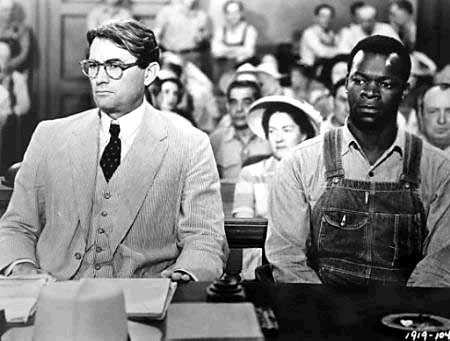
So the beloved Atticus Finch was actually a racist? The saintly small-town attorney of To Kill a Mockingbird was really a member of a local White Citizens’ Council, that network of retrograde organizations dedicated to white supremacy?
The publication of Harper Lee’s Go Set a Watchman has produced waves of anguish and despair among her fans, who fell in love with her coming-of-age tale featuring a courageous lawyer who bucked the townsfolk and endured threats to represent a black man falsely accused of raping a white woman. Generations have adored Atticus.
That man is hardly present in Watchman, which is apparently an early draft of the novel that eventually became Mockingbird. The two books are quite different, with a stunningly bigoted Atticus as the biggest surprise.
So what are we to make of Atticus now?
Pardon me for being literal here, but it’s probably helpful to remember that Atticus is a fictional character, a creation of Lee’s fertile imagination. Both versions of Atticus are.
As a native of Lee’s hometown, Monroeville, Alabama, I grew up immersed in tales of the people, places, and events that may have inspired her. Her father, Amasa Coleman Lee, was, indeed, a local attorney. But there is no record of his taking on a black defendant in a case that incited the anger of local white residents, as did the charge of rape leveled against Tom Robinson, the black defendant in Mockingbird. (Amasa Lee’s politics are lost in the footnotes of history, though there is little reason to believe he stood apart from his time and place.)
Instead, Mockingbird and Watchman are both explorations of Harper Lee’s views of the racism that enshrouded — indeed, straitjacketed — the South. Lee — “Miss Nelle,” to locals — was not a creature of her time and place.
Tomboyish as a child, she was known as brilliant, bookish, acerbic, and headstrong. And she clearly saw something wrong with the social structure dictated by Jim Crow. (I’ve had the pleasure of a few conversations with her, and it’s clear she’d never have fit in with the expectations for patrician white women of her day.) She explored, protested and illuminated that social structure in her fiction.
The just-published Go Set a Watchman takes place after Jean Louise Finch, a character who bears some resemblance to the author, is a young adult living in New York City. During a summer visit to her native Maycomb, she learns that her father, whom she believed a paragon of integrity, holds abhorrent views on race. So does her suitor, her father’s law partner.
A bit disjointed and lacking the lyricism of Lee’s later effort, the book deals with Finch’s efforts to come to terms with their bigotry. It rarely soars, but it does have its moments of insight and wisdom.
To Kill a Mockingbird, by contrast, is set in Finch’s childhood and makes her its masterful narrator. The novel is well written, sagacious and, with a noble Atticus, redemptive.
But it has drawn its critics over the years — reviewers who note the limitations of even that version of Atticus Finch. He was hardly a revolutionary who wanted to tear down Jim Crow, they say.
That’s true. If you read Mockingbird closely, you’ll see Atticus’ paternalism. He represented a patrician class that believed in a sense of fair play, especially before the bar of justice. But he was hardly advocating full equality for his black hirelings and acquaintances.
Still, I admire that Atticus. I accept him, despite his flaws, as an example of quiet heroism. He may not have broken ranks with Jim Crow, but his simple decency stood apart.
Young readers — and older readers, too, I believe — will continue to be drawn to the example of a fictional hero willing to sacrifice popularity in pursuit of a righteous cause. That’s a harder thing than most of us care to admit. So I believe the Atticus of Mockingbird will always endure, even if he’s temporarily overshadowed by a less virtuous one.
(Cynthia Tucker won a Pulitzer Prize for commentary in 2007. She can be reached at cynthia@cynthiatucker.com.)
Image: Screengrab from To Kill A Mockingbird (1962) via Wikicommons


